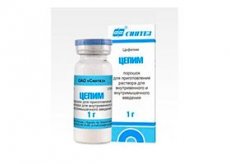Medical expert of the article
New publications
Preparations
Chains
Last reviewed: 03.07.2025

All iLive content is medically reviewed or fact checked to ensure as much factual accuracy as possible.
We have strict sourcing guidelines and only link to reputable media sites, academic research institutions and, whenever possible, medically peer reviewed studies. Note that the numbers in parentheses ([1], [2], etc.) are clickable links to these studies.
If you feel that any of our content is inaccurate, out-of-date, or otherwise questionable, please select it and press Ctrl + Enter.

The drug Cepim is an antibacterial agent belonging to the 4th generation cephalosporin antibiotics. ATX code - J01D E01. Manufacturer - Alembic Pharmaceuticals Ltd (India)
Other trade names: Cefepime hydrochloride, Cefepime, Cefomax, Cefsepime, Ladef, Maxipim, Efipim.
Indications Chains
The drug Cepim is used for severe multiresistant infections affecting the respiratory, urinary and digestive systems, liver, kidneys, pelvic organs, skin, soft tissues, bones, joints. The drug is effective for extensive abscesses, bacterial meningitis, peritonitis, sepsis.
Due to its high activity against Pseudomonas aeruginosa, Cepim's indications also include premedication of extensive surgical interventions to prevent postoperative purulent complications.
Release form
Sterile powder in vials for preparation of injection solution.
Pharmacodynamics
Cepim has a bactericidal effect against most aerobic β-lactam gram-positive cocci and gram-negative bacteria, as well as non-fermenting and chromosomal microorganisms, anaerobic bacteria and bacteroids.
The active substance of the drug, cefepime hydrochloride, binds to the enzyme of bacterial cell walls (transpeptidase), inactivating its participation in the synthesis of cytoplasmic membrane peptides, which leads to the cessation of cell division of microorganisms and their lysis.
Pharmacokinetics
After parenteral administration, Cepim enters all body fluids, binding to plasma proteins does not exceed 19%; the average therapeutic concentration in plasma is observed 12 hours after administration of the drug; bioavailability is 100%.
There is no cumulative effect; biological fluids and tissues are cleared of the active substance at an average rate of 120 ml per minute.
Biotransformation of about 85% of Cepima occurs partly in the liver with the formation of inactive metabolites. The half-life is approximately two hours.
Metabolites and unchanged cefepime hydrochloride are excreted by renal filtration in the urine.
Dosing and administration
Cepim is administered mainly intravenously (slowly), deep intramuscular injections are practiced in cases of infectious diseases of the urinary tract and pelvic organs.
The standard single dose for adults and children weighing over 40 kg ranges (depending on the severity of the condition) from 500 mg to 2 g. Injections are given every 8-12 hours, which is also determined depending on the severity of the inflammatory process. The minimum duration of use of Cepim is 7 days, but if necessary, treatment can be carried out for a longer period.
The dose for use of this drug for children weighing less than 40 kg is determined at the rate of 50 mg per kilogram.
For parenteral administration, a dose of Cepima should be dissolved in 10 ml of sterile water for injection, 5% glucose solution or 0.9% sodium chloride solution.
Use Chains during pregnancy
Use during pregnancy is permitted only according to indications and under the supervision of a physician. Caution is also required when using this medicine during lactation.
Contraindications
Cepim is contraindicated in cases of hypersensitivity to antibiotics - cephalosporins and penicillins, as well as in children during the first two months of life.
Side effects Chains
The use of Cepim may cause side effects that include urticaria; hyperhidrosis; headache; weakness; sleep disturbances; numbness of the extremities and cramps; increased heart rate and shortness of breath; cough and sore throat; decreased levels of leukocytes, erythrocytes and platelets in the blood.
Dyspepsia; abdominal pain; diarrhea or constipation; kidney dysfunction and increased liver enzymes may occur. In addition, superinfection may develop.
Overdose
Overdose of the drug can lead to various encephalopathic manifestations, including loss of consciousness, stupor, convulsions, comatose state. Treatment of overdose is carried out by hemodialysis.
Storage conditions
Cepim in powder form in a hermetically sealed bottle must be stored at a temperature of +18-25°C; the prepared solution can be stored for 24 hours at a similar temperature or for up to seven days in the refrigerator.
 [ 7 ]
[ 7 ]
Shelf life
24 months.
Attention!
To simplify the perception of information, this instruction for use of the drug "Chains" translated and presented in a special form on the basis of the official instructions for medical use of the drug. Before use read the annotation that came directly to medicines.
Description provided for informational purposes and is not a guide to self-healing. The need for this drug, the purpose of the treatment regimen, methods and dose of the drug is determined solely by the attending physician. Self-medication is dangerous for your health.

